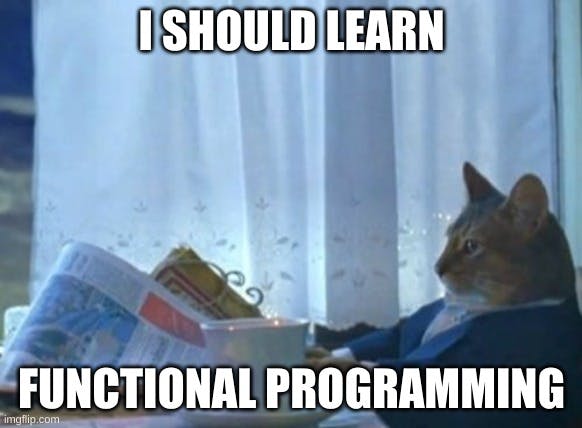Why Haskell?
For a long I wanted to learn something that will challenge my way of thinking about solving a problem.
There is a huge horror around "What is a Monad?" meme. I want to know about it(also wants to read Category Theory for Programming.)

And Haskell is Purely Functional.

I installed Haskell compiler / interpreter(ghc/ghci)
So, as it is a custom in computer science world that everything will start with Hello World! . We can do it in Haskell pretty simple as follows.
main :: IO ()
main = print "Hello World!"
Before diving more into code, let us try to understand the features of Haskell.
Features
Statically Typed
All Haskell values have a type. Every expression in Haskell has a type which is determined at compile time.char = 'a' :: Char int = 123 :: IntType Inference
As the type should be known at compile, you can specify explicitly in the program or You can leave it to compiler to decide for you.
Lazy Evaluation
Lazy evaluation is the main objective behind developing the Haskell language. It means an expression will not be evaluated until their results were needed in computation.
Purely Functional
Every function in Haskell is a function in the mathematical sense (...pure). eg. mathematical function f(x,y) = x+y => f(2,3) = 5 function in Haskell
add x y = x + y add 2 3gives the output of 5.
There are no statements or instructions, only expressions which cannot mutate variables (local or global) nor access state like time or random numbers.Concurrent
Haskell lends itself well to concurrent programming due to its explicit handling of effects.
few code snippets I tried today.
Square
square x = x*x
Comments
-- This is a single line comments
{-
This
is
a
multiline
comment
-}
Factorial
fact n = product [1..n]
fact 10
-- gives factorial of 10.
[1..10] is a list 1 to 10 == [1,2,3,4,5,6,7,8,9,10]
Map
map (+1) [1..5]
-- [2,3,4,5,6] adds 1 to every item in the list
Filter
filter (>5) [3..7]
--[6,7] filter values greater than 5.
I think it will be enough for today. See you again. There is an interactive section to try Haskell at Haskell Website if you have 5 min.